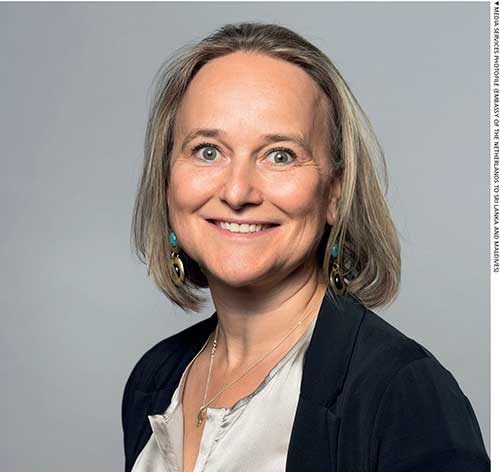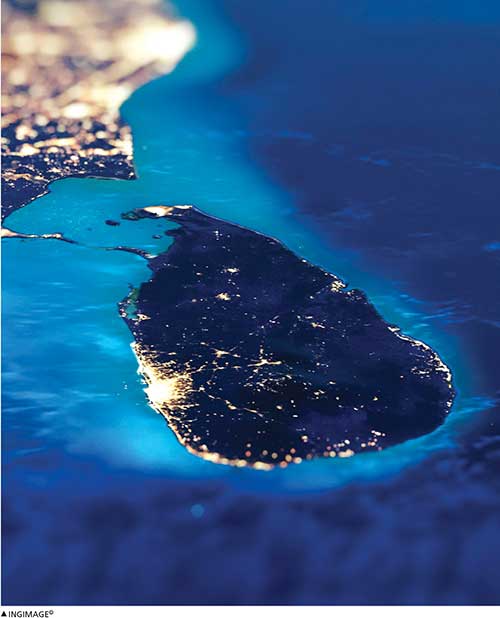TIES THAT BIND
Sri Lanka is a priority country in our international cultural policy
Ambassador of the Kingdom of the Netherlands to Sri Lanka and Maldives Bonnie Horbach

Q: How would you describe the state of bilateral relations between the Netherlands and Sri Lanka?
A: The ties between the two countries are longstanding, dating back to the early 1600s when we traded with Sri Lanka and eventually ruled parts of the island. This chapter in our shared history is problematic and one that we in the Netherlands aren’t proud of.
However, with initiatives such as the restitution of Sri Lankan cultural artefacts, which took place in December, the Netherlands aims to reconcile with its past, and open a new chapter based on a just and equal bilateral relationship.
The relationship between Sri Lanka and the Netherlands has always remained strong. We used to have a substantial aid programme but with Sri Lanka developing rapidly after the war ended, this was phased out.
Sri Lanka is a priority country in our international cultural policy, as demonstrated by the embassy’s support for multiple Sri Lankan projects in heritage, performing arts and design.
Our bilateral relationship is not limited to cultural affairs. We actively collaborate with Sri Lankan counterparts in the fields of human rights and the international rule of law, agriculture and maritime security.
Q: What are the key areas of trade and investment cooperation between the two countries?
A: As part of the EU initiative, the Netherlands strives to support Sri Lanka in its IMF debt restructuring process.
We believe that good governance and transparency are important pillars of healthy economic development, which will benefit the ease of doing business and ultimately create an enabling environment.
The Netherlands supports Sri Lanka by investing in sustainable business practices – particularly in agriculture and by advocating for responsible business conduct.
Through foreign direct investments (FDI), Dutch organisations have also contributed to building bridges, hospitals and water projects in Sri Lanka, all aimed at fostering durable economic and social development.
We also recognise that Sri Lanka has great agricultural potential, which is why we regard it as a valuable partner in this field. We’re involved in multiple sustainable agricultural projects that enable the exchange of knowledge and expertise, thereby increasing sustainable trade.
As part of this policy goal, we have supported projects focussed on capacity building, training professionals, and exchanging technology and knowledge – for example, by granting scholarships.
One project we’re currently working on is a sustainable agroforestry initiative that involves cooperation among businesses, universities, NGOs and government agencies in both countries.
Q: How important are cultural and educational exchanges in strengthening bilateral ties?
A: In December last year, six artefacts that were taken from Sri Lanka by the Dutch during colonial times were returned to the Colombo National Museum. These artefacts were originally in the possession of the King of Kandy before they were looted by Dutch occupiers.
Currently, these objects reside in the Colombo National Museum where they’re displayed to the public in a special exposition. It was a pleasure to collaborate with our partners at the national museum under the guidance of the minister of culture and the museum’s director general. Their level of expertise is impressive, and I believe that the artefacts have found a perfectly suitable and safe home.
There are many other areas in which we could develop new relationships such as within the fields of museums, archives, heritage, design, film, contemporary art, tourism and more. By returning these six cultural objects, we aim to create training programmes related to heritage, culture and museums.
Similarly, we aim to contribute to knowledge exchange by supporting Sri Lankan students in pursuing a master’s degree in the Netherlands in the field of heritage. I strongly believe that these programmes work best when they are based on local needs.
Q: Given the Netherlands’ expertise in environmental sustainability, are there any ongoing projects in Sri Lanka focussing on climate change adaptation?
A: The Netherlands aims to be a global leader in circular agriculture by 2030. To support this goal, the Dutch embassy in partnership with several organisations launched a collaborative agroforestry project in Sri Lanka.
The project seeks to introduce agroforestry as a sustainable alternative on degraded tea and coconut plantations, promoting diversified production, improved quality and sustainability.
Q: Looking ahead, what are your aspirations for the future of Netherlands-Sri Lanka relations?
A: As the oldest democracy in South Asia and a defender of human rights, Sri Lanka can play an important role as a partner in the multilateral arena. The Netherlands would like to liaise with Sri Lanka on issues of mutual importance.
Our relations go back more than 400 years – including a 150 year colonial history (1658-1796). The Dutch presence in Sri Lanka has left various forms of tangible and intangible heritage that still influence our present-day bilateral ties.
The bilateral ties have been further strengthened by the return of looted colonial artefacts in 2023. This creates momentum for the Netherlands to present itself as a valuable and neutral partner, extending beyond the cultural sector. This can also serve as leverage in the future.

FACT FILE
FAMILY
Single mom with a 15-year-old daughter
SCHOOLING
Elzendaalcollege Boxmeer
HIGHER EDUCATION
Law and history – University of Amsterdam
Post-graduate research in New York
Q: What’s one Sri Lankan word or phrase that you’ve learned, which you find amusing or unique?
A: It’s not a phrase but the moving of the head – not ‘yes’ or ‘no’ but something in between.
Q: When you’re not busy with diplomatic duties, how do you unwind?
A: I like to walk or run on my treadmill.
Q: What has been your most memorable travel experience in Sri Lanka so far?
A: Anuradhapura
Q: And what’s your favourite Sri Lankan cultural experience?
A: The Samūla heritage festival.
Q: Name a hidden gem or ‘must-visit’ place in Sri Lanka that you would recommend to visitors…
A: Trincomalee
Q: Have you tried cooking a Sri Lankan dish yourself? And if so, what is it?
A: I have tried many Sri Lankan dishes and I’m loving it! But I’m definitely hooked on coconut sambol.
